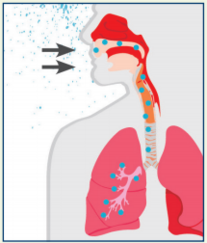 August 23, 2018 – Legionnaires’ disease is more common during the warmer months when temperatures are ideal for bacteria growth. However, regional epidemiologists are seeing an increase in cases in Ottawa, Kent and Muskegon counties. This increase corresponds with state and national increases. No common source has been identified related to the recent cases.
August 23, 2018 – Legionnaires’ disease is more common during the warmer months when temperatures are ideal for bacteria growth. However, regional epidemiologists are seeing an increase in cases in Ottawa, Kent and Muskegon counties. This increase corresponds with state and national increases. No common source has been identified related to the recent cases.
“It is important people are aware of the signs and symptoms of this serious type of lung infection and contact their doctor right away if they become sick,” said Marcia Mansaray, epidemiologist with the Ottawa County Department of Public Health.
 Legionnaires’ (LEE-juh-nares) disease
Legionnaires’ (LEE-juh-nares) disease
Legionnaires’ disease, a type of severe pneumonia (lung infection), is caused by breathing in small droplets of water that contain Legionella. In nature, Legionella live in fresh water and rarely cause illness. In man-made settings, Legionella can grow if water is not properly maintained. In general, people do not spread Legionnaires’ disease to other people.
If you develop pneumonia symptoms and may have been exposed to Legionella, see a doctor right away. Be sure to mention if you have used a hot tub, spent any nights away from home or stayed in a hospital in the last two weeks. LEARN MORE
Legionnaires’ Disease Can Cause Pneumonia Symptoms
Signs and symptoms of Legionnaires’ disease can include:
• Cough
• Muscle aches
• Fever
• Shortness of breath
• Headache
Doctors use chest x-rays or physical exams to check for pneumonia. Your doctor may also order tests on a sample of urine and sputum (phlegm) to see if your lung infection is caused by Legionella. Legionnaires’ disease is treated with antibiotics (drugs that kill bacteria in the body). Most people who get sick need care in a hospital but make a full recovery. However, about 1 out of 10 people who get Legionnaires’ disease will die from the infection.
Certain People Are at Increased Risk for Legionnaires’ Disease
Most healthy people do not get Legionnaires’ disease after being exposed to Legionella. Being 50 years or older or having certain risk factors can increase your chances of getting sick.
These risk factors include:
• Being a current or former smoker
• Having chronic lung disease, such as emphysema or chronic obstructive pulmonary disease (COPD)
• Having a weakened immune system from diseases like cancer, diabetes or kidney failure
• Taking medication that weakens your immune system
Certain People Are at Increased Risk for Legionnaires’ Disease
Outbreaks of Legionnaires’ disease are often associated with large or complex water systems, like those found in hospitals, hotels and cruise ships.
The most likely sources of infection include:
• Water used for showering (potable water)
• Cooling towers (parts of large air conditioning systems)
• Decorative fountains
• Hot tubs
